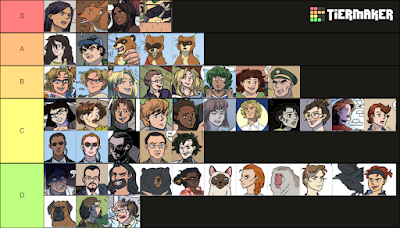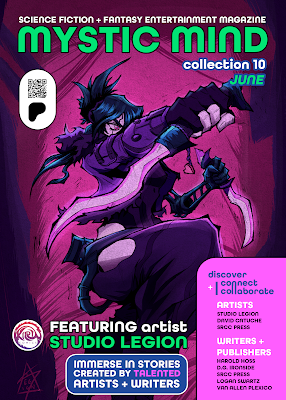Hope everyone is staying safe, and, of course, writing.
Just got back from this year's Comic-Con. While SDCC can be brutal and unforgiving at times, it is still one of my favorite things we do every year. There is so much, too much, to do and see (and buy) at the Con, also called the Show, that it would be impossible to go through everything here, but I will try to share what I learned in the panels related to writing that I attended in hopes that something I learned might be of use.
How to Get News Coverage, this panel is moderated by Rik Offenberger, the editor at First Comics News, and a creator in his own right with the G-Men series of books. The panel is meant to help comic book creators, but much would be attributable to other media as well.
Rik mentioned there are two types of marketing that a creator needs to do: first, is to the Comic Shops to buy it and secondly, to the Comic Shops to help them sell it.
When doing a press release, many on the panel wanted the press release to be in the body of the email and have links to the images. They don't want you to send them the comic book yourself.
Know the outlet that you're sending the press release to. If they cover comic books of a different genre than yours, don't send it to those outlets.
A press release should be about something that is about to happen, like the release of a book. It is important to send them as part of an EPK, or Electonic Press Kit, which should include, in addition to the Press Release:
- Bios of the creators
- Images
- the Cover
- Synopsis of the Book
Also, Rik made the point of trying TV News to get coverage. TV news has to fill in with stories about puppies, why not a story about you and your work? And if you can get that coverage, it can really help you seem more legit to other outlets as well.
What to Know When Selling an Animated Series, moderated by Siobhan Murphy (manager, The Gotham Group). One thing to note that most of the people on the panel represented channels like Nickelodeon or platforms like Marvel and Disney, which wouldn't really be open to something from the outside, however, they do get pitches.
If you do get the opportunity to make a pitch, again, make it to an outlet that would be interested in your story.
Their advice:
- Know your stuff
- The shorter the pitch, the better. Your window will be about 30 minutes, so you want your pitch to be 15 minutes because you want to be conversational.
- Don't flesh it out too much with not everything filled in
- Practice makes perfect
- If you get notes, don't freak out about them
- Why now? Why you?
- Story
- Art
- Creative Team
- Story
- Art
- Creative Team
- Target Audience
- Marketability
- How it Fits in with Publisher's brand
- Will you be a Good Partner?
- Cost and Revenue Analysis
- Title
- Contact Info
- Story Hook
- Project length (parameters)
- Genre, intended Age Group
- TELL the story
- Character Bios
- Artist Attached
- Thank you
- Should be Inviting
- Written in the Active voice
- Have Clarity
- Be brief
- Exciting
- Check grammar and spelling
- No Marketing needed
- Professional Art Only
- One Splash Page
- Character Designs
- Five pages of sequential Art (consecutive pages)
- Clear Storytelling
- Contact Information
- Do you know how to be a project manager?
- Are you a good communicator?
- Do you hustle?
- Do you strategize well?
- You will be required to submit "Final Files"
- If the Publisher has to rework your files, that costs the publisher time and money they didn't budget for
- They won't want to work with you again
- Is the STORY well told?
- Is the ART good?
- Do the Creators have a large fanbase already and do they HUSTLE
- Is the Concept Marketable?
- What rights are you giving up?
- What do you get paid? And when?
- The project is of a genre the publisher doesn't have a track record with
- The project is for an audience the publisher doesn't have a track record with
- The project may deal with topics the publisher wants to avoid
- The project is of a length that makes it unlikely to be solvent
- It's in a format the publisher doesn't do
- The company has a project in development that is similar to yours
- The publishing slate is full
- The project has production issues which make it onerous to work with
- The publisher doesn't think they can execute the marketing the book will require
- Doesn't fit in the publisher's overall vision for its line
Well, that about does it for me. Keep writing and I'll see you next week.







